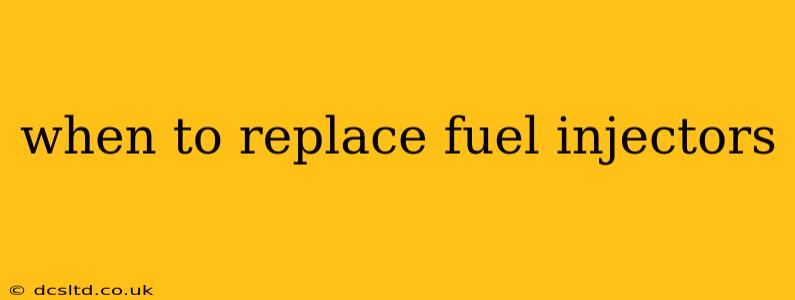Fuel injectors are vital components of your vehicle's engine, responsible for precisely delivering fuel into the combustion chamber. Over time, they can wear out, leading to decreased performance and potential engine damage. Knowing when to replace them is crucial for maintaining your vehicle's health and longevity. This guide will help you understand the signs and circumstances that warrant fuel injector replacement.
What are the Signs that My Fuel Injectors Need Replacing?
This is often the first question car owners ask. Several symptoms indicate potential fuel injector problems, some subtle and others more pronounced. Let's break down the key warning signs:
-
Rough idling: A shaky or erratic idle is a classic symptom. If your engine struggles to maintain a smooth idle, especially when cold, faulty injectors could be the culprit. This is because inconsistent fuel delivery disrupts the combustion process.
-
Poor acceleration: Noticeably sluggish acceleration or hesitation when you press the gas pedal can be a sign of underperforming fuel injectors. If the injectors aren't delivering the correct amount of fuel, the engine won't have the power it needs to accelerate smoothly.
-
Reduced fuel economy: A sudden drop in your vehicle's gas mileage is another significant warning sign. Inefficient fuel injectors waste fuel, leading to lower fuel economy.
-
Misfires: Engine misfires, characterized by a sputtering or knocking sound, are a clear indication of potential problems with your fuel injectors. A misfire occurs when the fuel-air mixture in one or more cylinders doesn't ignite properly.
-
Black smoke from the exhaust: Excessive black smoke from the exhaust pipe usually points to a rich fuel mixture, suggesting that your fuel injectors are delivering too much fuel.
-
Engine stalling: In severe cases, faulty fuel injectors can cause the engine to stall unexpectedly. This indicates a critical problem that requires immediate attention.
How Long Do Fuel Injectors Typically Last?
The lifespan of fuel injectors varies depending on several factors, including the vehicle's make and model, driving habits, and fuel quality. Generally, fuel injectors can last anywhere from 100,000 to 150,000 miles, but some may need replacement sooner. Aggressive driving, consistently using low-quality fuel, and neglecting routine maintenance can significantly shorten their lifespan.
Can I Clean My Fuel Injectors Instead of Replacing Them?
Cleaning your fuel injectors can be a cost-effective alternative to complete replacement, especially if the problems are minor. However, this is only a temporary solution, and severely damaged injectors may not respond well to cleaning. A professional mechanic can assess the condition of your fuel injectors and determine whether cleaning is a viable option. Cleaning often involves using specialized cleaning fluids or employing a fuel injector cleaning service.
How Much Does It Cost to Replace Fuel Injectors?
The cost of replacing fuel injectors varies greatly depending on the vehicle, the number of injectors needing replacement, and labor costs. You can expect to pay anywhere from a few hundred dollars to over a thousand dollars for parts and labor. Getting multiple quotes from reputable mechanics is highly recommended.
What Happens if I Don't Replace Faulty Fuel Injectors?
Ignoring faulty fuel injectors can lead to a number of serious problems, including:
- Engine damage: Continued use of malfunctioning fuel injectors can lead to significant damage to your engine, potentially requiring costly repairs or even engine replacement.
- Increased emissions: Faulty injectors can cause your vehicle to emit excessive pollutants, potentially leading to failing emissions tests.
- Reduced performance and fuel efficiency: As noted above, the effects on performance and fuel economy can be significant.
- Safety concerns: In severe cases, faulty injectors can cause the engine to stall unexpectedly, creating a safety hazard.
Regular vehicle maintenance and paying attention to any warning signs are key to ensuring the longevity of your fuel injectors and the overall health of your vehicle. If you notice any of the symptoms mentioned above, it's best to consult a qualified mechanic for a proper diagnosis and recommendation.
